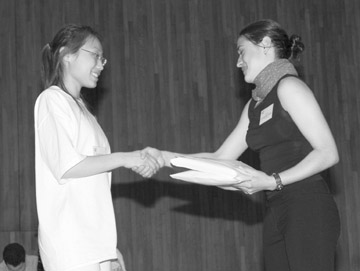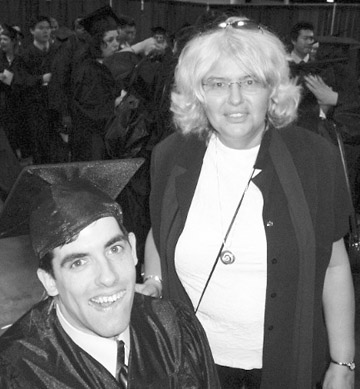Online Extra: Gora Evaluation Team Coming Late March
March 13, 2004
With her third year drawing to a close, UMass Boston Chancellor Jo Ann Gora is up for an evaluation.
The evaluation team, which is coming to campus March 23, is lead by Karl E. White, the UMass trustee currently in charge of the Board of Trustees’ Committee on Campus Climate. Also on the team is Gloria Larson, an attorney at Foley Hoag who was recently named the most powerful woman in the city by Boston Magazine; Katherine “Kay” Sloan, the current president of the Massachusetts College of Art; William F. Kennedy, UMass trustee and attorney at Nutter, McLennen, and Fish; and University Treasurer Stephen Lenhardt, the designated staffer for the team
Lenhardt said the group will be meeting with union, student, faculty, and staff leaders on campus for a general review. “It’s not just about the chancellor,” he said, but also the progress the campus has made under her leadership.
White and Larson were traveling and could not be reached for comment. Sloan, through a secretary, declined to comment. Kennedy did not immediately respond to phone calls.
Gora, the sixth chancellor in UMass Boston’s history, came to the harbor campus in August 2001, fresh off nine years as provost at Old Dominion University in Virginia. In her first year, the university was hit with budget cuts from the state legislature and fee hikes from the UMass Board of Trustees, and the early retirement of many tenured faculty. Over the last three years, budget cuts have amounted to over $30 million. Enrollment continues to decline, but many in the university community hope it will be arrested with the opening of the $75 million dollar Campus Center, and the beefing up of the Office of Student Affairs. Fee hikes appear to have finally stabilized and the university is ambitiously embarking to recruit new faculty (on par with the plan recently publicized by Northeastern University, according to the provost at a recent faculty council meeting).
Gora’s term has not been without controversy. The prospect of dorms has been pushed back into the exploratory phase, thanks to some community opposition and Governor Mitt Romney’s threats last year to cancel a bond sale that included monies for student housing. There have been scuffles with the College of Public and Community Service (CPCS) over the university’s mission and race relations, and tempers flared when CPCS Dean Ismael Ramirez-Soto resigned in the beginning of this academic year, adding to an already tense racial climate due to the April 2003 arrest by campus police of an Africana Studies professor. Gora called the incident “deplorable,” and has set up a Public Safety Advisory Board in response.
With the university gearing up for re-accreditation by the New England Association of Schools and Colleges (NEASC), now is a critical time for the young institution. At a convocation breakfast in September, Gora unveiled her three R’s: retention, research, and reputation. The three R’s form an integral part of the university’s strategic plan, which was recently presented to the Board of Trustees. Retention remains “critical to the future” of the campus, according to Gora. Strides are being taken in the area of research, with an increased push to develop strengths in public policy and science and technology. Reputation rounds out the three, with the university publicizing its role in the community and Boston, such as its involvement with Boston Public Schools teachers.
“In addition to people saying, ‘Yes, UMass Boston is a place where students can go to get a great education,’ we also want them to think of UMass Boston as a place that’s contributed into the community,” said Associate Provost Peter Langer in an February interview on the strategic plan.
In a May 2003 interview, at the end of her second year, Gora said it has been a “real roller-coaster of experiences and emotions,” adding that she is “in it for the long haul.”
The evaluation team includes:
KARL E. WHITE is a UMass trustee, appointed in 1999 by Governor Paul Cellucci. He is the executive director of the Massachusetts Bay Transportation Authority (MBTA) Retirement Fund, and the former managing principal of Gracian Capital Management. Currently, he is heading up the Board of Trustees’ Committee on Campus Climate, a task force formed in reaction to public uproar and “expressions of racial concern” from the resignation of College of Public and Community Service Dean Ismael Ramirez-Soto. The task force recently visited campus, and met behind closed doors, which also provoked outcry from faculty and students alike. White is also a member of the UMass presidential search committee, formed after UMass President William Bulger stepped down last summer. White’s term as trustee expires in September 2007.
GLORIA LARSON is co-chair of the Government Practices Group at Foley Hoag, a law firm. Named by Boston Magazine in May 2003 as the most powerful and influential woman in Boston, she is the Massachusetts Convention Center Authority Chairwoman. A Republican activist, she was appointed by Governor Paul Cellucci in 1998. She was Secretary of Economic Affairs under Governor Weld from 1993 to 1996. She and Gora share the same alma mater: Vassar College. Gora received a bachelor of arts degree cum laude, while Larson received one with honors. She has also sat on UMass Center for Collaborative Leadership Advisory Board.
KAY SLOAN is the current president of the Massachusetts College of Art, the last public college of art in the United States. Sloan has sat with Gora on the Boston Private Industry Council and the Massachusetts Public Research Interest Group’s (MassPIRG) 30th Anniversary Committee in 2002, along with U.S. congressmen, mayors, various presidents and chancellors of Massachusetts universities, and Shannon O’Brien, whom Sloan supported in the 2002 gubernatorial election.
WILLIAM F. KENNEDY is a UMass trustee, appointed by Governor Jane Swift in 2002, and an attorney with Nutter, McLennen, and Fish, where he chairs the Public Policy Group and remains a member of the Public Finance Group. He is the former chief of staff and chief legal counsel to the Massachusetts Speaker of the House of Representatives, Thomas Finneran (D-Mattapan). For two years in the early 1990’s, he was an assistant clerk to the Massachusetts Supreme Judicial Court for Suffolk County. According to his biography on the Nutter website, he was also an attorney for the Executive Council of the Commonwealth of Massachusetts, where he helped in approving judicial nominations. His term as trustee expires in September 2006.
STEPHEN LENHARDT, staffer for the evaluation team, is the university treasurer and vice president of management and fiscal affairs. When UMass President Bulger stepped down last summer, Lenhardt’s name was among the ones floated to take over on the interim, since he is seen as having “strong financial savvy as the university deals with budget cuts, program consolidations, possible layoffs and further student fee hikes,” according to a Boston Globe article at the time. Jack M. Wilson, UMass Vice President for Academic Affairs, was eventually picked and is serving as president until the Board of Trustees picks a permanent one.























































